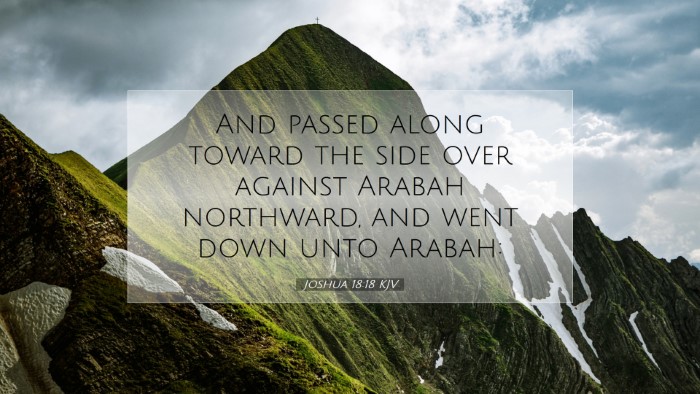Commentary on Joshua 18:18
The verse Joshua 18:18 states:
"And passed along toward the south side of the Jebusite, even to the south of the city of Jebus, which is Jerusalem."
Introduction
This verse is part of the narrative detailing the division of the Promised Land among the tribes of Israel after their conquest. It highlights the geographical boundaries and the tribal allocations, a task crucial for establishing the identity of the Israelites in their new land. The commentary focuses on the implications of territorial assignments and the historical context surrounding the Jebusites and Jerusalem.
Historical Context
Joshua 18:18 takes place during a critical transition in Israel’s history. Under the leadership of Joshua, the Israelites are in the process of settling in Canaan, following their exodus from Egypt and their journey through the wilderness. The mention of the Jebusites, the original inhabitants of Jerusalem, signifies the ongoing conflict and the divine promise of land possession. Matthew Henry points out the significance of Jerusalem, which would later become a central location for Israel’s monarchy and worship.
Commentary Insights
Matthew Henry
Henry emphasizes the importance of the geographical delineation as a means of honoring God’s promises to Israel. He interprets the passing of the lot to Jebusite territory not merely as a geographical boundary but as a sign of the Israelites' growing dominion and the eventual fulfillment of God’s promises through Joshua. He notes the spiritual implications of this land division, suggesting that the land, symbolizing spiritual rest, is a foretaste of the eternal rest promised to the faithful.
Albert Barnes
Barnes provides a detailed examination of the geographical references in the verse. He explains that the reference to Jebusite territory points to Jerusalem, and he notes the strategic importance of this location. Based on his interpretation, the south of Jebus marks a significant boundary line. Barnes also discusses the nuances of the local tribes, the Jebusites, emphasizing that the Israelites were still in the process of fully subduing the land. He holds that the territory’s gradual acquisition paralleled the spiritual journey of the Israelites as they learned to trust in God’s provision.
Adam Clarke
Clarke expands on the cultural implications of the verse. He discusses the Jebusite's significance as both adversaries and as part of the land that God promised to Israel. Clarke interprets the mention of Jerusalem as a foreshadowing of its future importance in David's reign and the establishment of the temple. He highlights the dual nature of occupying the promised land while confronting existing inhabitants, which signifies the challenge of maintaining faith amidst opposition. Clarke’s interpretation encourages believers to prepare for eventual inheritances through persistence and faith.
Theological Significance
The themes conveyed in Joshua 18:18 remind us of the tension between divine promise and human struggle. The land division symbolizes God’s faithfulness, and the Israelites’ obedience and perseverance reflect the process of spiritual inheritance. Pastors and theologians can draw parallels between Israel's physical battles and the spiritual battles faced by believers today. The Jebusites, representing opposing forces, remind believers of the need for vigilance and faith in overcoming personal and communal challenges.
Practical Applications
- Understanding God’s Promises: This passage encourages us to trust in God’s promises while taking practical steps towards their realization.
- Faith Amidst Opposition: Just as the Israelites had to confront the Jebusites, modern believers must contend with challenges that can hinder their spiritual journeys.
- Inherited Blessings: The land represents God’s blessings that believers are called to claim, underscoring the journey of faith required to possess them fully.
Conclusion
Joshua 18:18 serves as a reminder of God’s faithfulness to His covenant people and His promises. The act of dividing the land is significant not just for the physical settlement of the tribes but also for their spiritual inheritance. By embracing the lessons of obedience, diligence, and faith amidst challenges, believers can find encouragement in their own journeys of faith as they trust in God’s provision and promises.


